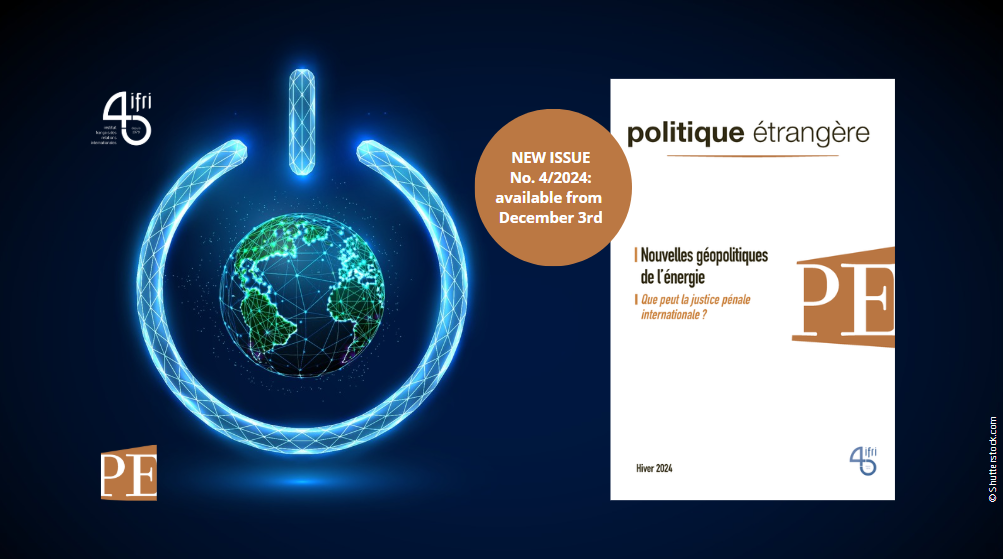The New Geopolitics of Energy

Following the dramatic floods in Valencia, and as COP29 opens in Baku, climate change is forcing us to closely reexamine the pace—and the stumbling blocks—of the energy transition.

Do the oil states in the Gulf have the desire and the means to transition away from oil and gas? Have the member states of the European Union made any progress since their piecemeal response to the Russian gas diktat? Will European and American strategies ever align? What place will nuclear and renewable energies occupy in the world of tomorrow, and beyond?In another arena, a faltering multilateralism—even on major matters transcending national boundaries—is holding back the work of the International Criminal Court.
And yet the ICC has come far since it was founded by the Rome Statute, exercising its jurisdiction over the most serious of crimes taking place in Ukraine and in Gaza. This undoubtedly marks a watershed in the short history of international criminal justice. Only time will tell whether national governments will rally behind the ICC’s progress, or whether it will have to settle for a more symbolic role as custodian of morality and international law.
International negotiations on climate change, and international prosecutions for the most egregious crimes: these are two areas where multilateralism, in dire need of reform, is struggling to assert itself within existing legal frameworks.
This issue is available in French only: Nouvelles géopolitiques de l'énergie
THE NEW GEOPOLITICS OF ENERGY
The Oil States in the Gulf: The End of Fossil Fuels?, by Kate Dourian
How have European Countries Disconnected themselves from Russian Gas?, by Didier Holleaux
The United States, the European Union, and the Green Great Game, by Alexandre Damiens
The Geopolitics of Renewable Energy, by Cédric Tellenne
Nuclear Energy: A Positive Outlook?, by Teva Meyer
WHAT DOES THE FUTURE HOLD FOR INTERNATIONAL CRIMINAL JUSTICE?
International Criminal Justice: A Decisive Moment, by Marc Perrin de Brichambaut
The International Criminal Court, between History and Geopolitics, by Joël Hubrecht and Virginie Sansico
CURRENT AFFAIRS
The Axis of Resistance: Iran’s Proxies since October 7, 2023, by Kévin Thiévon
Reforming the United Kingdom?, by Marie-Claire Considère-Charon
BAROMETERS
Asia and the Demographic Shock, by Paul Salez
From Cuba to Ukraine: Strategic Signaling and Nuclear Deterrence, by Héloise Fayet
REFLECTIONS
Would France Benefit from Leaving the European Union?, by Maxime Lefebvre
Switzerland’s Impossible Neutrality, by Matthieu Etourneau
BOOK REVIEWS
Under the direction of Marc Hecker
Espionner, mentir, détruire. Comment le cyberespace est devenu un champ de bataille, by Martin Untersinger
Soldat de la cyberguerre, by Arnaud Coustillière and Aude Leroy
Subversion: From Covert Operations to Cyber Conflict, by Lennart Maschmeyer
From Julien Nocetti
240 pages. 23 euros.
December 3th, 2024.
Diffusion : Pollen/Dif'Pop.
Subscription: Armand Colin.
To buy an issue: CAIRN.
To buy the Epub (in French): Immatériel.fr.
Have a look on Politique étrangère's blog: Politique étrangère.

Available in:
Regions and themes
ISBN / ISSN
Share
Related centers and programs
Discover our other research centers and programsFind out more
Discover all our analysesFinancial Tools for Boosting Resilience of CRM Value Chains and Strategic Stockpiling
Critical Raw Material (CRM) value chains are more vulnerable than ever and entire vital industries in Europe are now at risk if supplies are not secured through strategic and urgent actions, given mounting geopolitical confrontation, resource nationalism, growing demand and limited supply increase.
Placing the EU on a Warfare Footing: Energy and Raw Materials Priorities for 2026
The year 2025 has confirmed that one must prepare for much worse in the field of geopolitics and geoeconomics as the intensity and frequency of shocks increase and as the European Union (EU) has no more stable flanks now that crises with the United States (US) become so frequent and reveal a systemic rift. In the world, barriers to trade multiply and dependencies are weaponized.
Brazil One Year Away from the October 2026 General Elections
Brazil’s general elections will be held on October 4, 2026, to elect the president, vice-president, members of the National Congress, governors, deputy governors and state legislative assemblies. For the presidential and gubernatorial elections, a second round will be held on October 25 if no candidate obtains a majority of the votes in the first round.
COP30: An Inflection Point for Climate Action and Governance
The 30th Conference of the Parties (COP30), opening in Belém, Brazil, on November 10th 2025, convenes at a perilous moment.










